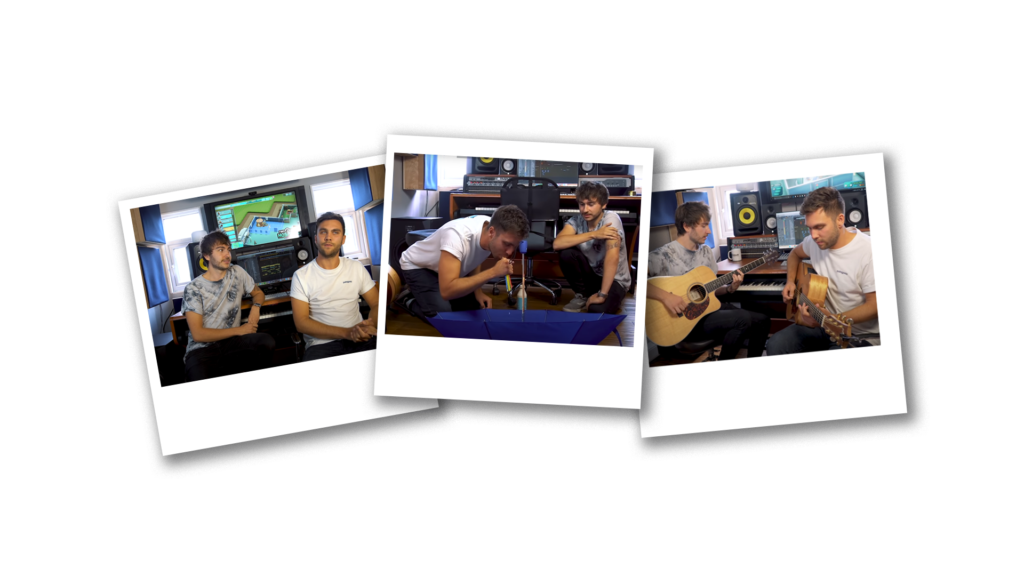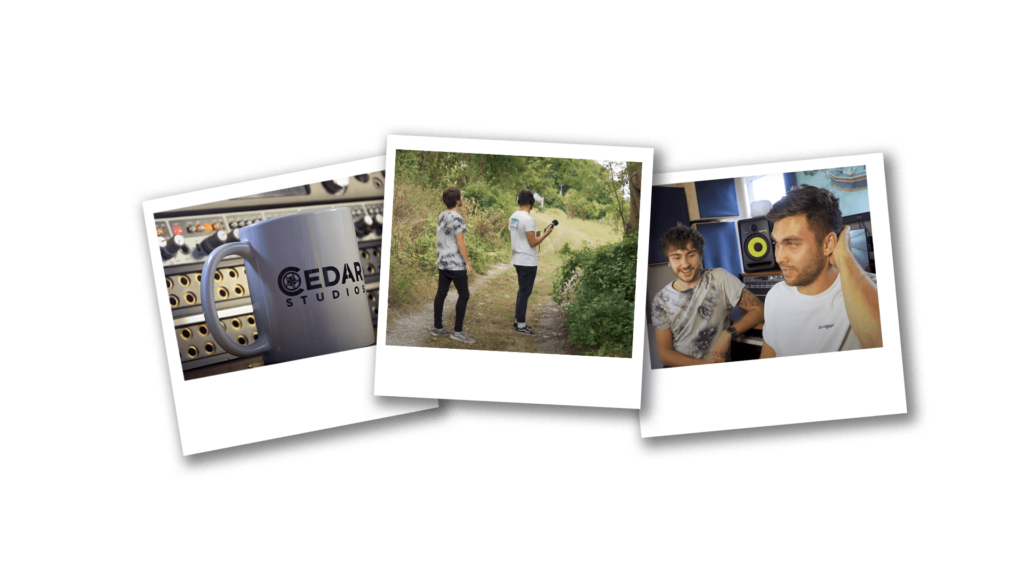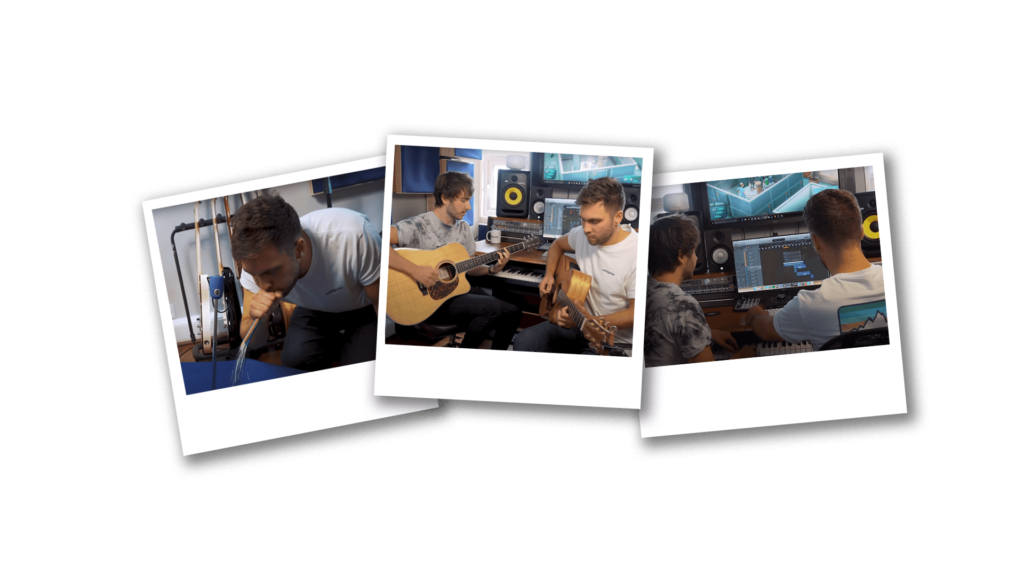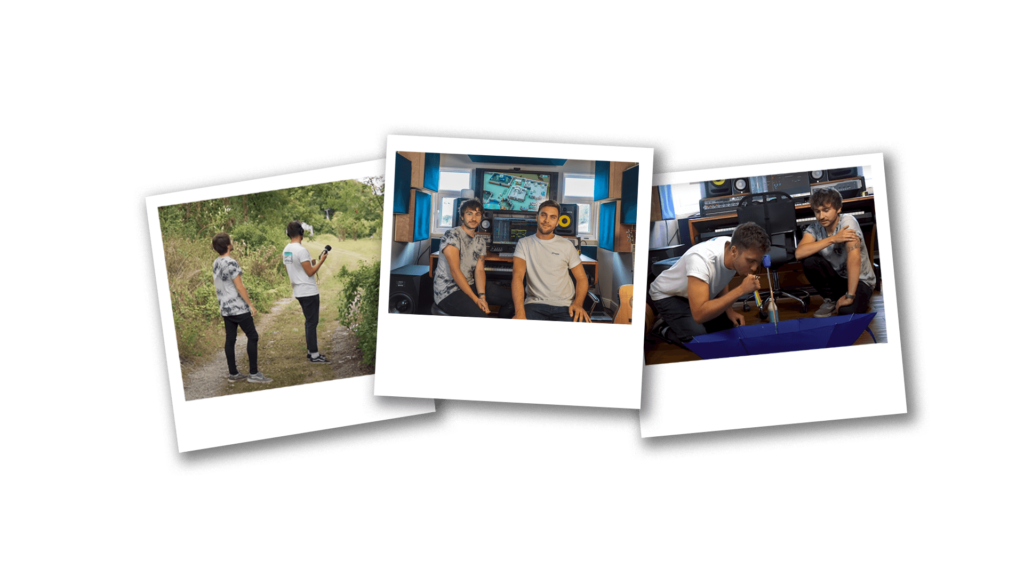Hi everyone,
With the release of the Official Two Point Hospital Soundtrack, we thought it’d be fun to chat to the masterminds behind it all, so they can tell us all about the music, their processes and how all of this musical stuff actually works! Meet Phil French and Tom Puttick from the legendary Cedar Studios, you may remember them from such videos as “Creating the Sound for Two Point Hospital“.
THE SOUNDTRACK’S JUST BEEN RELEASED ON STEAM AND PEOPLE ARE LOVING IT, HOW DOES THAT FEEL?
Phil: Awesome, strange and relieving. Having to keep the game and soundtrack a secret from our friends for around 2 years before the game was out felt like forever. But it’s really nice to have it all out in the open and for people to hear the music that 2 blokes wrote and recorded in a small shed.
Tom: It’s also crazy now it’s all released, how many tracks are in the soundtrack. So it’s really nice to know there’s a way to listen to them all easily. Hopefully people will find some tracks they might not have stumbled across yet in game!
WHAT’S YOUR PERSONAL FAVOURITE SONG FROM THE SOUNDTRACK AND WHY?
Phil: I would have to say ‘Come On Over’ I love the chord changes in there and there is some real geeky music theory stuff happening behind the scenes which we got a real buzz from at the time… sad I know. The use of secondary dominants were quite common throughout the soundtrack and there are a load of 13 and diminished chords to give that real jazzy flavour. Also there is the odd key change in a few tracks which you might not even notice because they are so smooooooth. We went through about 4 different versions of that track before it got to where it is now.
Tom: ‘Gypsy in the Jungle’ was a track we did for the Pebberley Island DLC, and I always love how real and clean the lead guitar sounds in that. I think that kind of old Gypsy Jazz style of music is perfect for these sim management type games. It’s good to hear chugging away in the background, without being too distracting to take away from the gameplay.

WHAT/WHO WERE YOUR INSPIRATIONS WHEN CREATING THE SOUNDTRACK?
Phil: We wanted something memorable, not annoying and something that wasn’t too generic. When we first got the gig, co-founders Mark & Gary wanted an elevator/Muzak style, which fits the background without becoming too distracting. Which I think we did but evolved it a little more to make it a bit more exciting.
Tom: We’re both big gamers, and were very much inspired by a lot of the games we played growing up as kids too. I’m a huge Nintendo fan, and always found their first party games, even their software store’s music super catchy. But also it never was too distracting from the experience which I respected. So we’ve definitely been molded by those composers we grew up with like ‘Kazumi Totaka’ and ‘David Wise’.
We grew up playing these kinds of games, and knew there was a level of expectations from people that we didn’t want to disappoint. We were fortunate enough to work closely with ‘Russell Shaw’ who worked on some classics to make sure we were capturing the perfect style to suit the game. We also got to show the game to ‘Adrian Moore’ too so it’s pretty crazy we got to work with such a prestigious team and get their approval, seeing as we grew up playing games/listening to their work.
TELL US A BIT ABOUT THE PROCESS YOU GO THROUGH WHEN COMPOSING SONGS FOR A GAME LIKE TWO POINT HOSPITAL.
Phil: We’re both guitarists so it naturally starts there for us. First we load up a reference, then start jamming some chords together, one person might have a melody idea so then we record in some guide tracks and start filing it out with other instruments. We love to get as many real instruments in as possible. For example guitar, ukulele and most of the percussion elements in Two Point Hospital are all real instruments. Oh and how can I forget the Polypipes instrument we made specifically for the game! Which is made out of bathroom PVC pipes and can be heard as the main melody on ‘Night Ward’.
Tom: There’s so many tracks in this game, we also would try and give ourselves weird limitations to help get some varied ideas out. Sometimes we’d force ourselves to try and write on the keys rather than the guitar to force us out of our comfort zone and get some interesting results. I think ‘Tiki Hut Party’ was one of those tracks where we wrote that piano/organ riff first, and built from that key phrase outwards. It’s great having each other though, not only can we bounce ideas off each other, there’s that extra level of scrutiny when it comes to what sounds good. Sometimes if one of us starts running out of steam on a certain part or idea, the other will be able to see through the fog and keep the momentum up which is great. Especially when you’ve both been listening to the same section on repeat for most the day.

HOW MANY PEOPLE WERE INVOLVED IN THE SOUNDTRACK?
Phil: The majority of tracks were Tom and I, but we also had a few collaborations. We had composer/friend of ours Jack Le Breton write two tracks for the soundtrack early on. We all got together at Cedar Studios and went through Jack’s compositions to record/arrange them with him to make sure they married up with the ‘Two Point’ style as we like to call it. Those two catchy numbers were ‘Samba de Medicana’ and ‘Recover & Regain’ by the way. Check them out! One of the tracks “The Gamble Man”, was actually the track we used to pitch to ‘Two Point Studios’ originally, and we had one of the Cedar crew Tom Keech help us out with that initial track.
Tom: And that’s just the writing/music side of things, in all honesty we worked really closely with Two Point throughout the whole soundtrack. Some mornings we’d sit in a whole office meeting and Mark Webley and Gary Carr would play whole length demos to everyone with us in the room to see what people thought. That was always quite scary. But there’s a lot of people involved across the board that got the soundtrack out there/even facilitated it being possible itself! So you’d be amiss to not mention every one at ‘Two Point Studios’ and ‘SEGA’ who deals with all that too.
JASMINE ODYSSEY IS A BELOVED CHARACTER IN THE GAME, TELL US HOW YOU MANAGED TO BRING SUCH A CHARACTER TO LIFE WITH HER MUSIC.
Phil: It started out as a radio advert in the game we made as a joke inspired by the GTA in car radio adverts, then when the game came out there were comments of people saying they needed the full versions. So we got the ‘all go’ to make the full versions and started to turn the adverts into full songs. Sophie Worsley was the singer on these tracks and still to this day on her personal youtube videos she still gets comments like “I came here for Jasmine Odyssey” which I think is just brilliant. Sophie we’re sorry for that. You guys should really check her music out though, she is awesome!
Tom: I knew Sophie Worsley (the singer) as a friend growing up and had been following her career and music for a while. Phil and I were going through our work contacts trying to find someone who not only could sing well, across a large variety of genres, but was also weird enough to think it was a good idea. Sophie was the obvious choice. Her vocals are always spot on, so any genre is on the table. Her versatility teamed up with the Two Point humour/writing is a match made in heaven.

JASMINE’S SONGS HAVE SOME HILARIOUS LINES, HOW MUCH FUN WAS IT TO WRITE AND RECORD THESE SONGS?
Phil: Harry Puttock, a Writer/Designer at the studio was the mastermind behind the lyrics and we just nudged a few words here and there to make them fit with the tracks. I believe we sent him a demo of the whole track fleshed out and he wrote the lyrics to the tracks from there. Once we had the demos in place we got Sophie to come down to the studio and recorded all the parts. She has a great sense of humour so was absolutely fine with singing the odd lyrics of ‘Nice Smelling Face’ & ‘Fish Whispers’.
Tom: We’d send Harry demos of how we imagined his lyrics working with the chords and phrasing, so I believe Harry has some very embarrassing audio clips of me singing early Jasmine Odyssey drafts somewhere in the archives… But it was great fun making music that sounds real/convincing using Harry’s crazy lyrics. The recording sessions were also pretty surreal. You have someone as spot on vocally, nailing every take like a pro, taking it really seriously, singing the most ridiculous lines over and over again. Getting to show the team the final results of those recording and mix sessions was exciting too, but very much a moment where we were questioning “Is this real?”.
FINALLY, IF A BUDDING MUSICIAN WAS LOOKING TO GET INTO THE INDUSTRY, WHAT ADVICE WOULD YOU GIVE THEM?
Phil: DON’T DO IT! (I’m only joking). My advice would be to look for indie companies or friends that may be working on a game and start networking, create new friendships based on the love of games and music, then send some sample tracks over to them!
Also, know your stuff. Having knowledge of a recording software such as ‘Logic’ or ‘Pro Tools’ is crucial to get anywhere in music nowadays. As it seems the role of a composer nowadays is to be a musician / producer / mixer and mastering engineer all in one. So at least try to have a good understanding and some practice in these subjects!
Tom: 100 percent agree with Phil there, I’d also add on to the list to download software like ‘Unity’ and any audio middleware etc. They’re usually free to download/mess around with, and getting your hands dirty with implementation and how it works is only going to help you in the long term. (You can google almost anything to help you learn nowadays).
On a more soppy note, keep passionate about it, play games and write music for fun. The more you play games and music, the more you’ll learn. In the same way that practising an instrument is important to improve, the same goes for playing games and keeping up with that.
A huge thanks to Phil and Tom for taking the time out of their recording schedules to answer these questions, we hope you’ve found it an interesting and insightful read.

